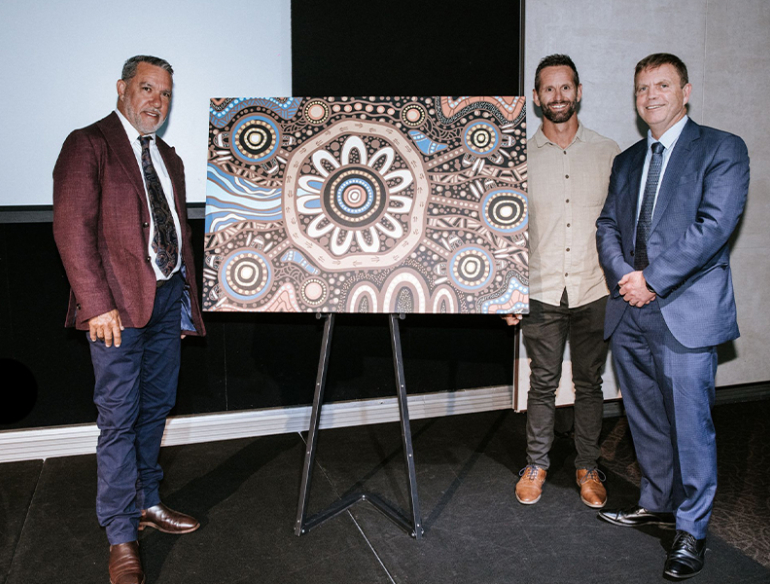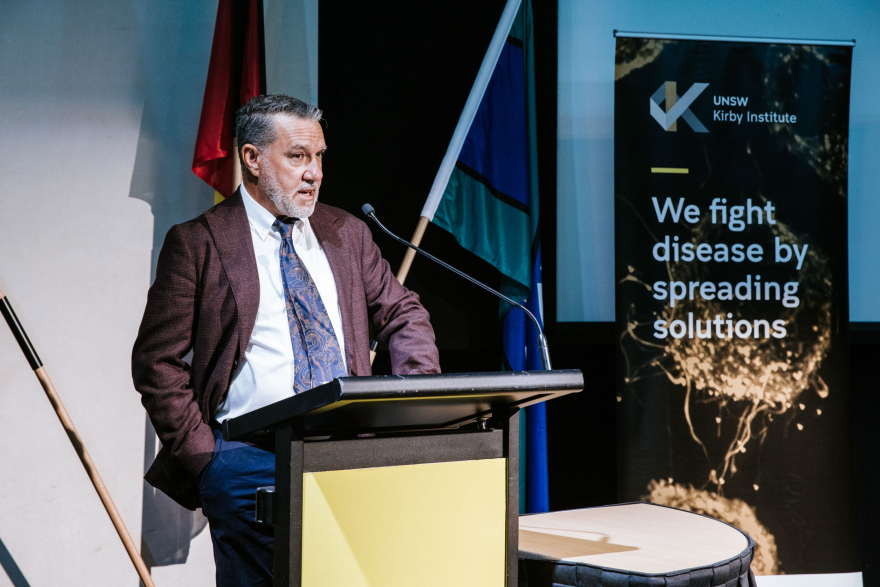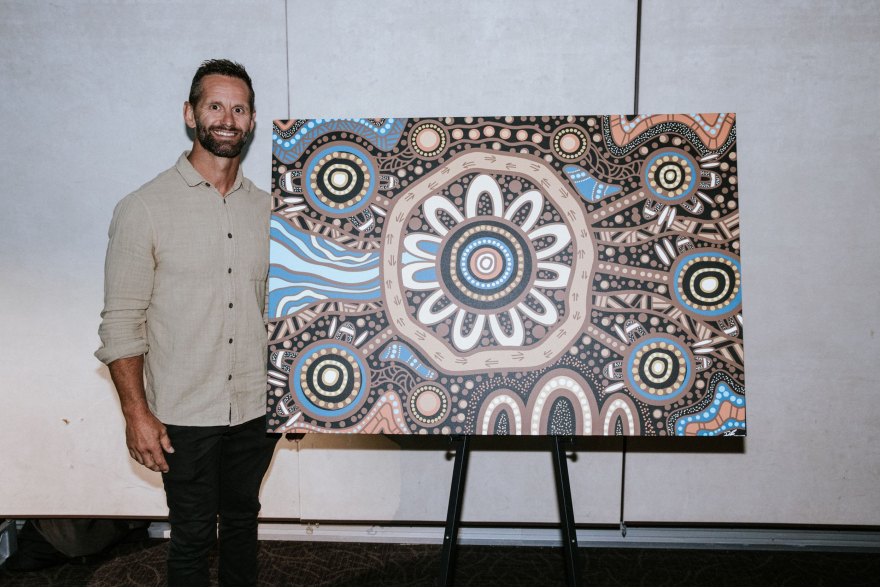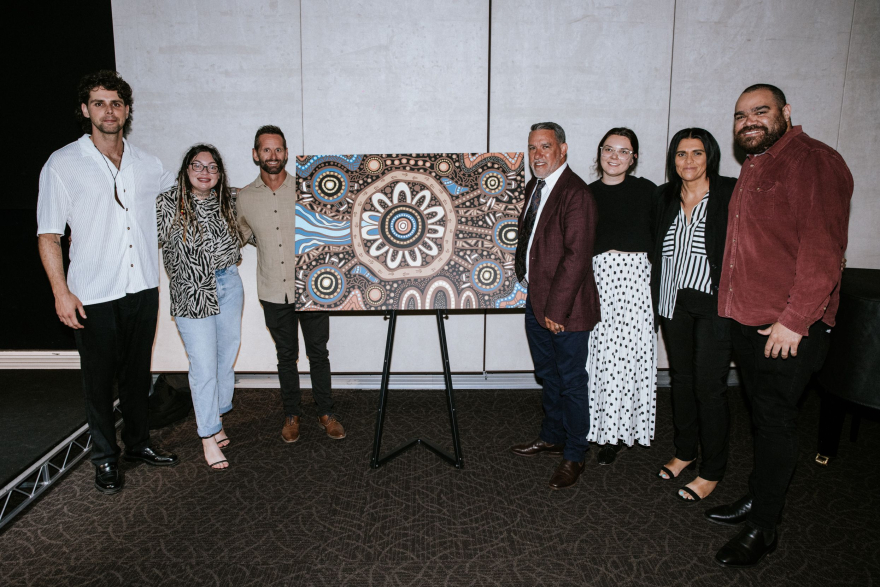In acknowledgement and celebration of the expanding growth and impact of First Nations-led research, the Kirby Institute at UNSW Sydney has launched the Yandamanjang First Nations Health Research Program, at a special event at UNSW Sydney.
The name Yandamanjang (yah-nuh-mun-yung) was developed in close consultation with the Gujaga Foundation, the peak organisation leading language, cultural and research activities within the La Perouse Aboriginal community, the traditional lands where the Kirby Institute is located.
“Yandamanjang means we are all walking together, which symbolises our approach to First Nations Research at the Kirby Institute. Led by First Nations researchers, we co-design and co-conduct infectious disease research with First Nations communities across Australia, and in this way, the findings of our research can be easily implemented in the real world, leading to better health outcomes,” says Robert Monaghan, a Bundjalung and Gumbaynggir man and Manager of Yandamanjang at the Kirby Institute.
The Kirby Institute has conducted research in partnership with marginalised communities since its inception and has had an established Aboriginal and Torres Strait Islander Health Research Program since 2008.
“Over the past five years, under Rob’s leadership, we have expanded our First Nations workforce from one to twelve people. We’ve also arranged cultural sensitivity training for the majority of Kirby Institute staff, with the aim that all staff do this training. It’s through this shared understanding and respect that we can work together to tackle some of the most complex health challenges,” says Scientia Professor Anthony Kelleher, director of the Kirby Institute.
“Renaming the program is the culmination of many years of collaboration that has put First Nations people in charge of the research that impacts them. I’m so proud of the work our First Nations and non-Indigenous staff have conducted in partnership at the Kirby Institute, and that moving forward this work can continue under a name that truly represents the values that drive our research approach.”
Professor Leanne Holt, UNSW’s Deputy Vice-Chancelor Indigenous congratulates the Kirby Institute on the renaming, and on their longstanding record of impactful research co-designed with Aboriginal and Torres Strait Islander communities.
“It is encouraging to see Aboriginal and Torres Strait Islander research leadership celebrated and elevated at one of UNSW’s key research institutes. I look forward to our continued partnership and collaboration with the Yandamanjang team.”
Connection through unity
Alongside launching the new name, an artwork was designed to visually represent the story of the Kirby Institute approach to First Nations research. Created by First Nations artist, Daniel Evans, the work symbolises ‘connection through unity’.
“Creating unity begins with fostering genuine connections—listening to First Nations voices, understanding their health practices, and respecting their knowledge,” says Daniel Evans.
The artwork was unveiled last night by Mr Evans.
We are all walking together, but we have a long way to walk
Most infectious diseases disproportionately impact First Nations peoples. Those residing in rural and remote areas face particularly significant barriers to accessing healthcare.
Rob Monaghan says that while renaming the program marks an important milestone in the Kirby Institute’s First Nations research story, there remains a lot of work to be done.
“Tonight, we celebrate our achievements, but tomorrow we’ll get back to our work addressing health disparities and building strengths-based initiatives in First Nations communities. When it comes to infectious diseases, there is a great need for better health access in our communities. Fortunately, recent innovations like point-of-care testing, can bring services into remote communities. But we need to do this in a way that is sustainable and culturally appropriate,” he said.
Recent impact in the Yandamanjang First Nations Health Research Program:
- A growing workforce. Over the past five years, the Kirby Institute has seen substantial growth in First Nations workforce, from one to twelve.
- Ensuring the Kirby Institute is a culturally safe place to work. To date, the Kirby Institute has hosted 10 Cultural Awareness and three Ethical Research Training sessions for more than 190 staff.
- A visit to the UN. In June 2024, Project Manager Emily Phillips was invited as a panellist representing Indigenous people at the Multi-stakeholder Hearing on Antimicrobial Resistance (AMR), held at the United Nations (UN) Headquarters in New York.
- Ongoing research achievements. The Kirby’s First Nations staff, working in partnership with non-Indigenous researchers, have made a number of impressive research achievements over the past few years. These include the First Nations Molecular Point Of Care (POC) Program, which has introduced on-the-spot testing and diagnosis for STIs and respiratory infections among rural and remote Australian communities. With many remote communities located hundreds of kilometres away from laboratory testing facilities, there are often major inequities in healthcare accesses, leading to disproportionate infection rates among Aboriginal communities. Timely treatment not only has individual health benefits, but can also positively impact public health due to reduced onward transmission.
- Community impact. The Kirby recently partnered with Durex, Durri Aboriginal Corporation Medical Service and Walkabout Barber as part of a pilot program to help improve sexual health awareness among young Aboriginal men via a purpose-built barber shop on wheels. This pilot program provided young men in the area with a free haircut, as well as a safe space for them to talk and learn about mental and sexual health.
- Medicare rebates now available. Evidence generated through Kirby Institute research recently led to the first Medicare rebate for an infectious disease point-of-care test.
- A major piece of work for which the Kirby Institute has been known for many years is the creation of the Blood borne viral and sexually transmissible infections in Aboriginal and Torres Strait Islander peoples: Annual surveillance report. The report, and accompanying infographic, is produced for use by a wide range of health service providers and consumers, and particularly Aboriginal and Torres Strait Islander health services and communities.
- The Kirby Institute has also been responsible for national trachoma surveillance in collaboration with NT, WA, SA and Queensland. In good news, we have reported the sharp declines in trachoma prevalence that followed the introduction of community treatment with azithromycin.
- The Kirby Institute provides significant research leadership in the area of HTLV-1. HTLV-1 is a significant global health threat, and in Australia it is endemic in First Nations peoples. There is currently no vaccine, cure or direct-acting antiviral treatment, but Kirby Institute researchers are working in partnership with local communities to uncover solutions.
- The SCALE-C Study is evaluating the impact of a community-based “test and treat” intervention on HCV prevalence among individuals who attend Aboriginal Community Controlled Health Services and other Aboriginal medical services.



